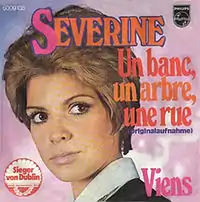Un banc, un arbre, une rue
"Un banc, un arbre, une rue" ("A Bench, a Tree, a Street") was the winning song of the Eurovision Song Contest 1971 performed in French by French singer Séverine, representing Monaco.
 | |
| Eurovision Song Contest 1971 entry | |
| Country | |
| Artist(s) | Josiane Grizeau |
| As | |
| Language | |
| Composer(s) | Jean-Pierre Bourtayre |
| Lyricist(s) | Yves Dessca |
| Conductor | Jean Claude Petit |
| Finals performance | |
| Final result | 1st |
| Final points | 128 |
| Entry chronology | |
| ◄ "Marlène" (1970) | |
| "Comme on s'aime" (1972) ► | |
The song is a classic French ballad, with the lyric focusing on the loss of childhood innocence, and people following their dreams. The opening lines to the chorus translate as "We all have a bench, a tree, a street/Where we cherished our dreams/A childhood that has been too short".
Four teenage male backup singers provided accompaniment. During Preview Week, Séverine sang the song in the empty square of Monte Carlo, first walking to a bench, then sitting down while performing the middle verses, and then ending the song by walking away out of camera focus.[1]
The song received the maximum score of 10 points (currently 12 points) from six voting nations. This song holds the record of receiving the most 10 point scores from this voting era.
"Un banc, un arbre, une rue" was performed third on the night, following Malta's Joe Grech with "Marija l-Maltija" and preceding Switzerland's Peter, Sue & Marc with "Les illusions de nos vingt ans". By the close of voting, it had received 128 points, placing it first in a field of 18.
Séverine recorded the song in four languages; French, English (as "Chance in Time"), German ("Mach' die Augen zu (und wünsch dir einen Traum)") and Italian ("Il posto"). Despite the existence of an Anglophone version, however, it was the original French version which reached the UK Top 10, a rare non-Anglophone hit in that market.
The song was succeeded as contest winner in 1972 by Vicky Leandros singing "Après toi" for Luxembourg.
It was succeeded as the Monegasque representative at the 1972 Contest by Peter McLane and Anne-Marie Godart with "Comme on s'aime".
The melody was adapted and arranged in 1973 by Paul Mauriat as the theme tune for the Miss Hong Kong Pageant, hosted by Television Broadcasts Limited[2] and has been highly familiar among generations of Hong Kong people since then. In that same year, Finnish singer Carola Standertskjöld recorded her version in Finnish, "Penkki, puu ja puistotie". Siw Malmkvist recorded a Swedish version 1971, "På en gammal bänk" (On an old bench).
Chart positions
| Charts (1971) | Peak position |
|---|---|
| Belgium/Flanders (Ultratop)[3] | 3 |
| Belgium/Wallonia (Ultratop)[4] | 1 |
| France (SNEP)[5] | 4 |
| Germany (Media Control) | 23 |
| Ireland (IRMA) | 3 |
| The Netherlands (Dutch Top 30)[6] | 13 |
| Norway (VG-lista[7] | 2 |
| Switzerland (Swiss Hitparade)[8] | 5 |
| United Kingdom (Official Singles Chart)[9] | 9 |
Sources and external links
- Official Eurovision Song Contest site, history by year, 1971
- Detailed info and lyrics, The Diggiloo Thrush, "Un banc, un arbre, une rue".
| Preceded by "All Kinds of Everything" by Dana |
Eurovision Song Contest winners 1971 |
Succeeded by "Après toi" by Vicky Leandros |
References
- https://www.youtube.com/watch?v=O4Q8D1JAwqY
- Eurovision Song Contest 1970-79 Archived 2007-10-13 at the Wayback Machine
- "Séverine - Un banc, un arbre, une rue".
- "Séverine - Un banc, un arbre, une rue".
- "Archived copy". Archived from the original on 2012-01-27. Retrieved 2013-07-19.CS1 maint: archived copy as title (link) Select "Severine" from the artist drop down menu
- "Séverine - Un banc, un arbre, une rue".
- http://norwegiancharts.com/showitem.asp?interpret=S%E9verine&titel=Un+banc%2C+un+arbre%2C+une+rue&cat=s
- http://swisscharts.com/song/Severine/Un-banc,-un-arbre,-une-rue-189
- "Artists".